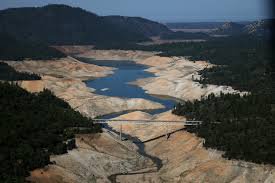A simple Google search for Californian water contamination reveals the tip of the iceberg.

California water pollution facts:
- California has many, many water quality challenges.
Local challenges are many. They are caused by both human actions and naturally occurring processes. Some contaminants come from past activities, such as mercury from mining, but many sources of pollution are ongoing. Additional pollutants continue to be identified. - Small communities face chronic water quality problems.
Almost 400 small rural water systems and schools can't even provide safe drinking water.
In some areas, nitrate—produced by nitrogen fertilizers and manure—has polluted local groundwater basins.Chemicals such as arsenic and chromium-6 are also a challenge. Treatment to remove contaminants is costly for small systems that do not benefit from economies of scale.
Solutions for at-risk communities statewide would require additional expenditures of $30–$160 million annually –and this may grow as requirements are tightened.
- Salt buildup is a major water quality concern for cities and farms.
It's one of our most common pollutants. Salt occurs naturally in some soils but it's also found in fertilizers, animal waste, and urban wastewater. - Water quality has declined with the extended drought.
River flows and reservoir releases help maintain water quality for aquatic species. During the present drought, low flows and extended heat have raised water temperatures and caused lower oxygen levels in rivers and streams.At Alkaway we have always understood that it's the little guys who are at most risk. They don't have the money to instal costly water purification systems, so they do the best they can, buying an off-the-shelf water filter that -especially in rural situations, only filters things they don't need filtered – like chlorine and lead. A well or rainwater home has special requirements and here at AlkaWay we configure our water filter systems for just this need.
Here at home we rely on both well water and rain water. We use a combination of high level sediment filter to catch the high sediment levels in the rainwater that feeds the kitchen, then our UltraStream to remove all the other contaminants that land on our roof, blown in from polluted, sprayed farmland.
In this way the integrity of the UltraStream is preserved, giving high performance over a long time. Sediment is easily trapped prior to the UltraStream in a recyclable ceramic filter. This saves money on filter replacement while maintaining the very high level of filtration given to the UltraStream owner.
If you don't want to wait for the government to send you a water filter but understand you can't get an off-the-shelf solution…
Check us out.
Talk to Leon in USA
Talk to Angela in Canada
Talk to Callum in UK
Talk to JJ in Singapore and Malaysia
Talk to Michael in Australia
Talk to Leon in NZ

